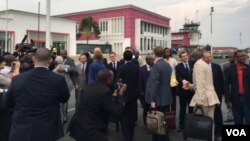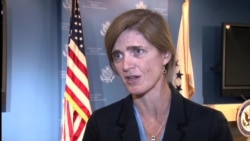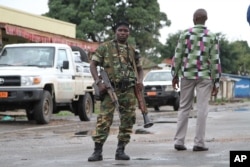A United Nations Security Council delegation arrived in Burundi Thursday with a message for the government and opposition to start substantive dialogue and avert catastrophe before it is too late.
“This is a critical crossroads for Burundi,” U.S. Ambassador Samantha Power told VOA ahead of the trip. “They cannot let it become business as usual that you wake up in the morning and there is a corpse on the street as you try to get to work, and that is what is starting to happen in Burundi.”
It is the second time the Council has visited the country in less than a year a clear indication of its growing concern about the escalating bloodshed.
Political crisis
Election related violence has killed at least 439 people since April and sent tens of thousands fleeing inside the country and beyond for safety.
Observers fear that the violence sparked by what is seen by many as an unconstitutional third term for President Pierre Nkurunziza could result in another civil war between the country’s ethnic Tutsis and Hutus, similar to the one that plagued the country from 1993 to 2005.
“What must not happen in Burundi is that this conflict moves from a political phase to an ethnic phase,” U.N. Deputy Secretary-General Jan Eliasson told reporters Tuesday. “When you take that step, then we always pay a price, because then there is a new element entering the conflict which will be much harder to control.”
Mediation
In July, the East African Community (EAC) regional bloc asked Ugandan President Yoweri Museveni to mediate between the government and opposition groups, but that effort has so far been fruitless.
Earlier this month, peace talks between the two groups were postponed, and no new date was announced.
“We need to find a way that allows the opposition to engage with the government. The government says it supports intra-Burundian dialogue, but it’s not happening,” said Britain’s Deputy U.N. Ambassador Peter Wilson. “If the Ugandan process does not work, then we need to find a process that does,” he added.
“We will come in and throw our weight behind accelerated mediation of the kind that should have taken place over these many months,” Ambassador Power emphasized.
The U.N. Secretary-General’s Special Advisor on Burundi, Jamal Benomar, says there still is a window of opportunity for Burundians to come together and find a way to move forward.
“For them to do this, they would need an inclusive process that is impartially mediated, one that has a timeline that is clear, an agenda, an agreement on who will participate — and this is exactly what we don’t have," Benomar said.
African Union troops
Last month, the African Union announced it would deploy a 5,000-member “prevention and protection” force to Burundi for an initial period of six months. The Nkurunziza government, however, has firmly opposed the idea.
African heads of state will meet January 28 to discuss what to do next.
Within the Security Council there is some difference of opinion on the need for troops right now.
“This idea of troops, we are not necessarily going there to say that troops have to be there in Burundi,” said Security Council Ambassador Ismael Gaspar Martins of Angola, who is co-leading the Council trip with his U.S and French counterparts. “It is the primary responsibility of the state to protect their citizens, to stop these, all kinds of situations, which are going on and we should be able to see that they are doing it right,” he added.
Diplomats say Council members China, Russia and Egypt also have expressed reservations about intensified involvement.
Ambassador Power said stakeholders should consider how such a force could “become a friend to stability, rather than something” that is threatening Burundian sovereignty.
Fallout
More than 230,000 Burundians have fled the country over the past nine months, including many members of the country’s civil society.
Human rights violations are growing. On Friday, U.N. High Commissioner for Human Rights Zeid Ra’ad al Hussein warned of new cases of sexual violence against civilians by security forces, reports of mass graves, and an increase in forced disappearances.
The crisis also is having steep fiscal implications on the tiny nation.
“They are in an economic crisis — and that’s an undeniable fact,” said British envoy Wilson. “They are possibly going to become the world’s poorest country this year. There is a real risk of food insecurity in Burundi. There is a real risk that a political divide is going to lead to an economic mess.”















